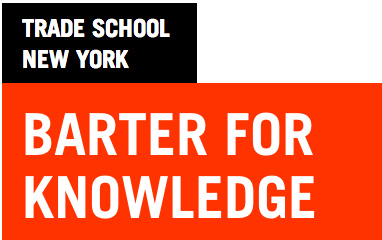Trade School is New York’s remarkable barter-for-learning program, now in its third year. The current set of classes finish this weekend, with one dedicated to teaching the basics of climate change from a science and policy standpoint. (Bill McKibben might say that’s very timely this weekend, as Hurricane Sandy draws closer to our shores.)
Trade School — Climate Change: Science, Economics & Policy
2 West 13th Street
New York
The climate is changing in profound ways with potentially huge social, economic, environmental, and cultural implications. However, too often these changes are
represented in the extreme; either as an apocalyptic judgment visited upon profligate humanity or as the latest cynical plot of a cadre of alarmist schemers. In reality, global climate change is an extremely broad scientific phenomenon with myriad outcomes, many of which are highly uncertain, but which taken together are almost certain to be very costly. This course is based on a similar class at MIT and will teach you the fundamentals of climate science, including: why we know that the climate is changing, how the climate has changed in the past, and how we expect the climate to change in the future. I will address each of these questions with the goal of empowering you to represent scientific fact to your community, and wade into the waters of climate controversies with confidence. In addition to climate science, this course will also discuss the economic theory of various climate policies (including cap & trade, carbon taxes, and international policies), as well as the current state of climate policy in the U.S. (and internationally, if time permits). This course is designed to be approachable by a novice, but those with some scientific education will likely appreciate the scientific aspects more richly.
Taught by Christopher W. Gillespie
Chris Gillespie is a fellow at the EPA in Washington, DC working on climate science and aviation impacts. He has a M.S. from MIT in Technology and Policy where he worked at the Joint Program on the Science and Policy of Global Change. As an undergraduate, Chris studied engineering at the Cooper Union.
About Trade School:
